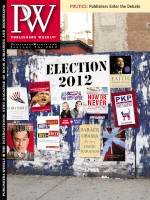In a move that reflects both shifting political dynamics and market forces, Thomas Nelson has slashed its politics program, from as many as 20 new titles per year in the early 2000s to just five in 2012. The books now target not only Christian conservatives but also moderates and liberals through such offerings as a new, evenhanded edition of The Faith of Barack Obama (Nov.), first released in 2008.
“In the boom of conservative book publishing that happened in the early part of the decade, there was a glut, and it became harder to make the kind of margins we needed,” says Joel Miller, v-p of acquisitions and editorial at Thomas Nelson. “Other [publishers] began to realize the same thing. The market can only sustain so many titles.”
As candidates for president give religious testimonies and jostle over faith in the public square, publishers are still feeding the hungry—at least those hungry to make sense of all the religion on the campaign trail. But the menu has changed since recent election years.
Today publishers are serving up less of the hot, emotional fare that feeds religious zeal for partisan positions. They’re replacing it with a varied diet to help readers think with depth and level heads about their own religiously grounded views, as well as those of their political opponents.
Wm. B. Eerdmans set the tone this fall with The New Evangelicals by New York University professor Marcia Pally (Nov.). Readers who love to fear evangelicals and ascribe to them what Pally calls “prototheocratic yearnings” might be surprised. Moral concerns about war, poverty, and other issues have led many evangelicals to reconsider GOP ties, Pally argues. The takeaway for secular liberals: those who paint religion or evangelicalism as inherent enemies of liberal democracy traffic in false stereotypes that hamper progress.
Author Ron Sider encourages this evangelical shift toward the center with Fixing the Moral Deficit: A Balanced Way to Balance the Budget (InterVarsity Press, Mar.). Readers will find a left-leaning evangelical’s take on America’s debt crisis and a Bible-based critique of proposals on the table in Congress.
To be sure, many on the left still fret about foes in religious clothing. For them, HarperOne is offering a tool to know thy enemy more deeply. From the pen of liberal journalist Michael Sean Winters comes God’s Right Hand: How Jerry Falwell Made God a Republican and Baptized the Religious Right (Jan.), a biography that tracks the heritage of today’s social conservatism. Expecting a solid response, HarperOne’s initial print run is 30,000 copies. The book offers “a way to figure out what the real agenda is on the right,” says Roger Freet, executive editor at HarperOne.
Americans tired of gridlock might support a new publishing venture that sees religious values as gateways to more productive politics. That’s the hope at Russell Media, a two-year-old virtual publishing house that will release 12 books on religion and culture this year. For campaign 2012, Left, Right & Christ (Russell Media, Oct.) lays out divergent positions on eight topics from two Christians, Lisa Sharon Harper and D.C. Innes, who followed their tradition’s teachings to opposite ends of the political spectrum. “The whole idea is really to foster understanding between competing agendas within the faith worldview,” says Russell Media CEO Mark Russell.
Abingdon uses a different twist to reach readers weary of polarization. While other new books plumb how religion is shaping political views, Hijacked: Responding to the Partisan Church Divide (Feb.) explores instead “what might we do to exorcise the demon of political partisanship from our churches?”
Voters of all stripes will be boning up on Mormonism if Mitt Romney wins the GOP nomination. That’s the expectation behind the timing of several new histories. The Mormon People (Random House, Jan.) renders the Mormon story as a pursuit of utopia, including early ties to Christian socialism. LDS in the USA (Baylor, Feb.) tracks Mormon influence on culture, from jurisprudence to the arts. From Oxford University Press, which produced a record-setting five new titles on Mormonism in 2011, comes a February paperback reprint of People of Paradox, an exploration of Mormon cultural life.
Catholic voters might not always heed their bishops, but they do value input from fellow laypeople. That premise informs the essay collection, Voting and Holiness (Paulist Press, spring 2012). “The teachings [of the Church] are clear” on the evil of abortion and other social justice issues, said editor Nicholas Cafardi. “But the political policies that will achieve those teachings are open for discussion.”
Voters seeking blessings of the partisan type that were all the rage in the early 2000s will have slimmer pickings this year, but they won’t starve. In February, FaithWords kicks off a 22-city tour for Indivisible: Restoring Faith, Family and Freedom—Before It’s Too Late (Feb.) by James Robison and Jay Richards.
Likewise, those seeking to understand President Obama’s spiritual beliefs will find new resources providing context. Russell Media’s The Presidents and Their Faith (Feb.) gives a quick thumbnail treatment of every president’s religious life. Faiths of the Postwar Presidents: From Truman to Obama (Univ. of Georgia, Mar.) devotes a full chapter to each man’s religiosity.
This season’s crop of books won’t put an end to polarization in politics, nor will they merely stoke its flames. But readers might come away more informed about religious dynamics in a campaign season where faith is sure to be a factor.



 Volume 259
Issue 03
01/16/2012
Volume 259
Issue 03
01/16/2012





